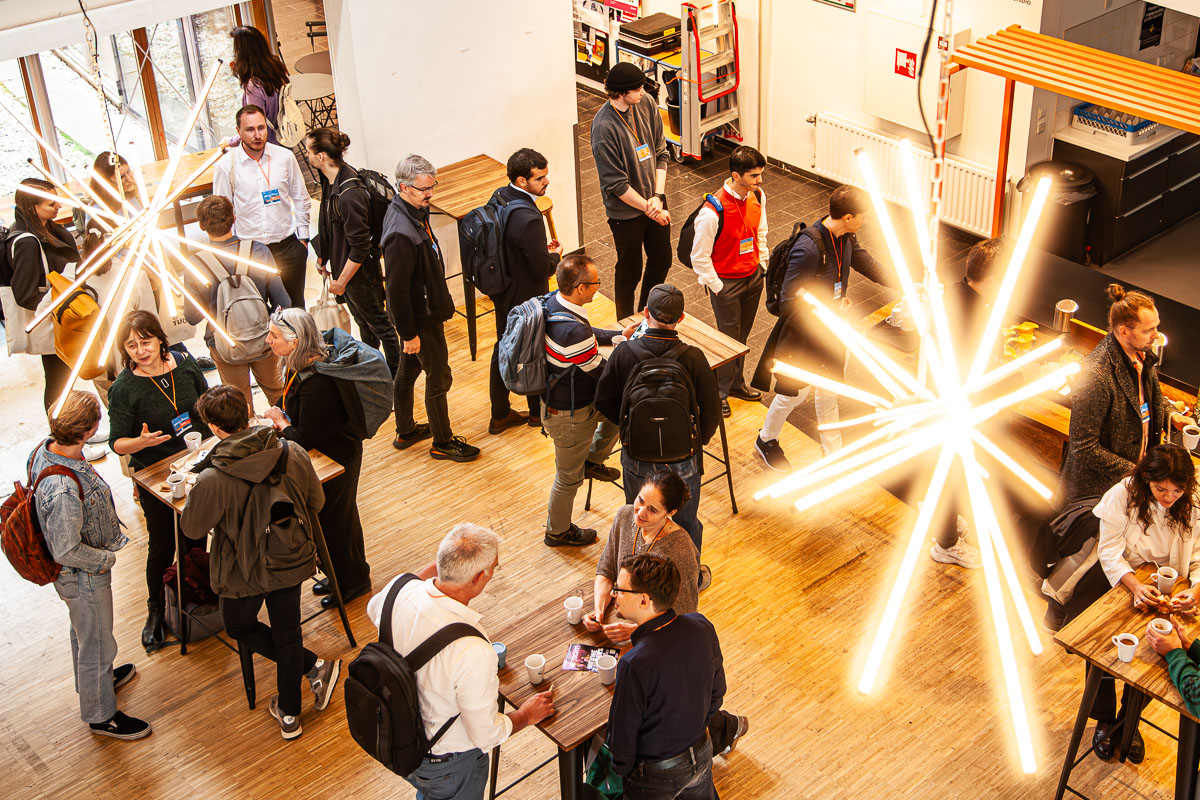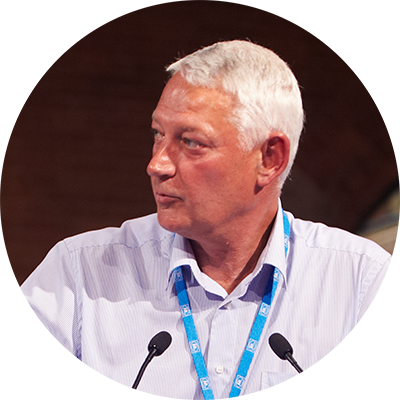Masaryk University, Brno, Czechia
Thursday, 2 October, 9:30
Visual Representations Addressing The Temporal Aspect Of Biomolecular Data
Abstract • When analyzing and exploring complex biological datasets, we often have to handle their temporal aspect, capturing the evolution of certain phenomena. Their proper visual representation and understanding can significantly influence the decision-making processes. In this talk, I will outline the issues and challenges in visualizing long and complex time series of biomolecular datasets and demonstrate possible solutions that have been developed in the past years.
Bio • Barbora Kozlikova is an Associate Professor at the Faculty of Informatics, Masaryk University, Brno, Czech Republic. She a member of the Department of Visual Computing and is heading the Visitlab research group focusing on diverse topics in visualization. Barbora got her Ph.D. in Computer Graphics in 2011. Her main research interests are visualization and visual analysis with diverse application areas, including biochemistry, medicine, geography, and criminology. With her 7 Ph.D. students she is working on many interesting research topics. She is responsible for several courses taught at our faculty and I’m always interested in starting new collaborations. She has organized the EG EuroVis 2018 conference and also the EG VCBM 2019 workshop.
TU Delft, Delft, The Netherlands
Thursday, 2 October, 16:00
Whose Knowledge Counts? Rethinking Objectivity in Data and AI
Abstract • We tend to assume that data is objective, sometimes even unquestionable truth, especially as we leverage it in AI to uncover patterns, make predictions, and drive decisions. Data is often treated as neutral and universal knowledge, ignoring the systems and perspectives that shape it. Critical computing and feminist epistemology challenge this view, exposing how claims of objectivity can conceal bias, reproduce exclusion, and silence lived experience in data-driven technologies. I argue that questioning what counts as “data” and whose data count is not a distraction from scientific and technological advancement but is essential to it. By embedding plurality, participation, and transparency into data-driven systems and AI, we can design technologies that reflect human complexity rather than erase it, opening the way for more inclusive and just forms of progress.
Bio • Dr. Sara Colombo is an Assistant Professor of Designing Responsible AI at the Faculty of Industrial Design Engineering, Delft University of Technology. She is director of the Feminist Generative AI Lab at TU Delft. Her academic work investigates novel approaches, methodologies, and tools to design fair and ethical AI systems, empower individuals through AI, and shape AI futures through public engagement. Her research aims to merge data feminism and design futuring approaches to explore new ways to co-create more inclusive and just AI futures. She believes in the ability of design to envision future worlds and to inspire a more just and ethical development of technology for society.
Leiden University Medical Center, Leiden, The Netherlands
Friday, 3 October, 9:00
High Dimensional Analysis Of The Human Intestinal Immune System Identifies A Disease Associated Network Of Immune Cell Subsets
Abstract • The immune system protects us against invading pathogens and plays an important role in the eradication of particular types of tumors. On the other hand, dysregulated immune responses underlie the development of a large variety of immune mediated disorders like celiac disease, type 1 diabetes, rheumatoid arthritis and inflammatory bowel diseases. Also, novel approaches to enhance immune activity against cancer can lead to the development of autoimmunity, stressing the need to develop more tailored immune interventions to prevent such unwanted side effects. Much effort is thus focused on unraveling the positive and negative aspects of immune activation. For this novel technologies like single cell mass cytometry and RNA-sequencing are used to decipher the complexity of the immune system and the mechanisms that either enhance or dampen its activation. We have been using these technologies to collect data on the tissue resident immune populations in the intestine, the organ that contains the largest immune compartment in the human body. Here we have focused on gaining insight in the development of the human intestinal immune compartment and its involvement in inflammatory bowel disease. For the analysis of the complex datasets we have made use and developed tSNE-based tools. The results reveal an previously unappreciated complexity in the intestinal immune system and demonstrate that coordinated activity of a variety of immune subsets underlies disease activity. Moreover, we observed that dynamic monitoring of the development of the tSNE plots reveals potential developmental pathways that drive the generation of harmful immune populations while suppressing regulatory mechanisms. We anticipate that such results may ultimately be used to develop patient-specific immune interventions.
Bio • Frits Koning has been a staff member in the department of Immunology of the Leiden University Medical Centre since 1993. He was the CEO of the Dutch Celiac Disease Consortium (CDC) in which immunologists, geneticists, food specialists and medical doctors collaborated with industrial partners to improve the quality of life of patients with celiac disease. He is well recognized for his contributions to the field of immune mediated disorders, celiac disease in particular. Through his work it is now well established which gluten fragments are disease causative and how they are recognized by disease-related T cells, providing a molecular basis for the genetic association between HLA-DQ and celiac disease. In his most recent work he uses high dimensional flow and mass cytometry to unravel the involvement of the innate and adaptive immune system in Inflammatory Bowel Diseases.
Elisabeth-Tweesteden Hospital, Tilburg, The Netherlands
Friday, 3 October, 15:30
Brain Imaging Beyond Anatomy: A Network Approach For Safer Brain Surgery
Abstract • There is no brain surgery without imaging. Traditionally, surgical decision-making has relied on anatomical images from CT and MRI, providing essential information about the location and extent of pathology. While indispensable, such anatomical guidance alone is no longer sufficient. Brain tumors, for example, not only displace but also infiltrate functional tissue, and their impact on brain networks leads to large interindividual variation. This challenges the traditional localizationist model and underscores the need for a network perspective.
Recent advances in neuroimaging and visualization enable us to move beyond static anatomy and to capture the dynamic organization of brain networks. By adopting this perspective, surgical planning can more effectively balance oncological goals—maximizing resection—with preservation of neurological and cognitive functioning.
The challenge, immense in itself as it addresses the structure–function problem of the brain, extends beyond image acquisition and network analysis. The impact of advanced methods depends on their adoption by clinicians and on how results are communicated to end-users—the neurosurgeons and clinical teams in the operating room. Visualization must therefore not only represent the complexity and uncertainty of networks, but also make them clinically interpretable and actionable.
In this talk, I will discuss recent developments in advanced MR imaging and network-based visualization, and how they can be incorporated into neurosurgical planning to support more effective and safer brain surgery.
Bio • Geert-Jan Rutten is a neurosurgeon at Elisabeth-Tweesteden Hospital (ETZ) in Tilburg with a clinical and scientific focus on the relationship between brain structure and function. He specializes in awake brain tumor surgery and deep brain stimulation. His research employs advanced neuroimaging techniques such as functional MRI and tractography to understand how neurological and cognitive functions are affected by brain tumors and surgery. Dr. Rutten has co-led multiple interdisciplinary projects to develop personalized, image-guided neurosurgical tools based on the human connectome. He holds a professorship at the Department of Mathematics and Computer Science at TU Eindhoven, bridging clinical neuroscience with computational modeling.



 Barbora Kozlíková,
Barbora Kozlíková, Sara Colombo,
Sara Colombo,  Frits Koning,
Frits Koning,  Geert-Jan Rutten,
Geert-Jan Rutten, 